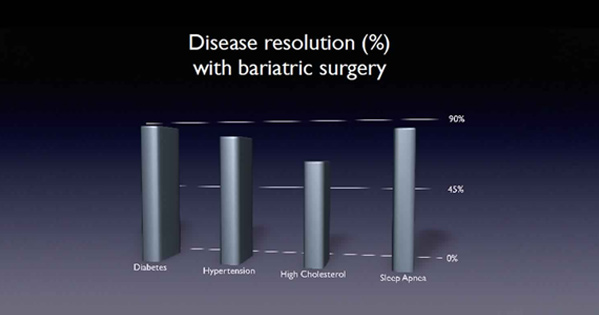Life After Bariatric Surgery
Bariatric weight-loss surgery is one of the most transformative interventions in modern medicine. A single procedure can have a profound and lasting impact on health and well-being of an individual. While the majority of medical or surgical interventions aim at correcting a single disorder, bariatric weight-loss surgery is able to correct a plethora of physical, medical, and psychological disorders by addressing their common underlying cause: excess weight. The result is nothing short of magical. With sustainable loss of over 80-100 lbs., a tremendous load is lifted from the musculoskeletal system, resulting in decreased joint and back pain. As the need for energy consumption is decreased, sense of chronic fatigue is reduced. With decreased pain and fatigue, there is increased tolerance of physical activities, including ability to exercise, travel, work, and perform activities of daily life.

Positive impact of bariatric surgery on mental health is well documented. Following weight loss, patients experience improvement in psychological well-being, self-esteem, and body image. With resolution of obstruction sleep apnea, they experience improved quality of sleep and decreased fatigue during the awake state. As a result of an improved state of mind, quality of social and work-related interactions improves. Patients report greater prospects at making new friends or securing work promotions. After a lifetime of inhibitions, individuals find limitless opportunities to advance boundaries of personal and social fulfillment.

Impact of bariatric surgery on medical health is extra-ordinary. Following procedures such as Vertical Sleeve Gastrectomy, there is complete resolution or significant improvement in high blood, Diabetes Mellitus, obstructive sleep apnea, hypercholesterolemia, and other related conditions in over 80% of the patients. With decrease in blood pressure, there is decreased risk of stroke and heart attack. With resolution of Diabetes and insulin resistance, there is improvement in kidney function, nerve function, eyesight, and immune function. Weight loss reduces respiratory effort, and improves oxygenation and ventilation capacities of the lungs. With decreased accumulation of fat within the liver, there is resolution of non-alcoholic fatty liver disease. With resolution of sleep apnea, there is decreased risk of pulmonary hypertension and cardiac arrhythmia. With the loss of adipose tissue, there is improvement in hormonal imbalance associated with polycystic ovarian disease and infertility. Together, these and many other health benefits result in increased quality of life and longevity.

In order to achieve maximum success with bariatric surgery, individuals often choose to lead an active lifestyle that includes frequent aerobic activities. They also adopt and maintain a healthy eating style, which includes consuming a diet composed of wholesome ingredients from natural sources, reducing portion size, avoiding processed foods, minimizing added sugar and refined carbohydrates, reducing foods with high saturated fat including fast foods, and controlling compulsive and emotional eating. If needed, professionals like registered dietitians, support group coaches, or behavioral therapists can provide necessary help to devise plans that lead to long-term success.

Over the past decades, many longitudinal studies with long-term follow up have shown that the majority of bariatric patients are successful at losing over 60-70% of their excess weight and maintaining their new weight years after the procedure.

